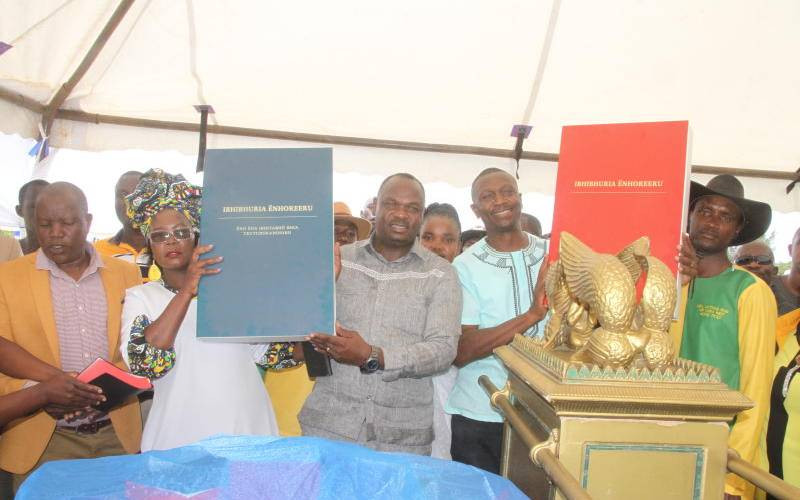
Most communities are now eyeing Bible translation into their languages to preserve their culture in the face of increased rural-urban migration.
From the major to minority tribes, the Holy Book has been translated into different dialects with the help of original speakers in an exercise that has taken the Bible Society of Kenya (BSK) more than 10 years.
Just as the hymns are translated to words that the communities can understand and relate to, the clergy in several parts of the country have since forwarded their requests to BSK to give them a Bible that would enable them to spread the gospel in native languages.
The National Director of Word for the World Bible Translators Kenya, James Roba, said the clergy in 12 sub-tribes in Kenya have requested Bible translations.
“After their requests, we did a survey and shared the findings with clerics from all churches in the 12 communities, and the process to translate the Bible into the dialects has started,” said Roba.
Translators are currently burning the midnight oil to deliver the Bible in dialects such as Marama, Kikisa, Marachi, Bukhayo, Terik and Borana.
Family values
The ACK Diocese of Mbeere and local leaders said the translation will go a long way in inculcating social and family values through the gospel.
They said many residents cannot read and understand foreign languages and this has forced them to remain outside church ministries.
Across the Coast region, only the Giriama, Digo, Taita and Duruma enjoy a fully translated Bible, both in the Old and New Testaments. The rest are still awaiting the long process to have their own translations.
The Pokomo New Testament was completed in 2005 (also in audio format) by the Bible Translation and Literacy (BTL) but work on the Old Testament is ongoing.
“The Pokomo Old Testament is with the printer in Korea being published. By the end of this year or early next year, it will be ready to be launched and dedicated,” said Edward Jillo, the Bible Translation, and Literacy, Coast Region Assistant Language Programmes Manager.
Jillo said the translation of the Bible is key in helping the young generation keep abreast with the word of God while learning and relating to their own mother tongue.
“If you love your language, you love your culture. It is through language that you can express your culture.”
Jillo, who is also a consultant in translation and linguistics for over 27 years, said in many churches in rural areas, the masses are conducted in Kiswahili or English yet they speak their mother tongue in their homes.
He said translated Bible speaks to the hearts of the communities and they are able to comprehend the meaning in its original Hebrew and Greek format.
“We don’t translate words but the meaning. We study the original text and pick out the meaning and re-express it in a clear way that makes the community feel like the Bible is actually speaking to their heart,” said Jillo. He said there are some communities that don’t have their own church songs and all songs of the liturgy are in English and Kiswahili.
Mother tongue influence
Among the ongoing translation projects include the Taveta New Testament, Chonyi New Testament, and Wate New Testament, among others.
The Giriama Bible was dedicated in April 2019 while Digo (May 22, 2021) and Chidigo sub-dialect in November 2021.
He said in the past, neglecting and abolishing mother tongue in schools made the current generation grow up hating their language and culture.
“There are many people in big positions currently who hate their language and culture as a result of being punished for speaking their mother tongue in school. The wearing of tags labelling them as fools for speaking vernacular impacted negatively on their esteem,” said Jillo.
He said when a child is introduced to mother tongue in school and goes to church and finds the same being offered in Bible studies and scripture materials, they understand much better.
Jillo said the children undergoing the mother tongue language programme tend to have a better vocabulary than their own parents and love their culture.
“Parents these days say their children don’t know their own languages but it is because as parents, they underwent a school programme that banned vernacular and planted a negative attitude towards their mother tongues and they passed it to their children,” said Jillo.
He said despite taking many years to fully translate a Bible, technology has helped in speeding the tedious and expensive translation process that takes up to 37 years.
20-year project
Now it takes just between six to seven years to translate the New Testament while it takes less than 20 years to translate a full Bible. He said technology like the Paratext has enabled them in translation and spreading the online version.
Jillo said every language in the world changes after every 15 to 20 years and is necessary to translate the language for the current and future generations.
He said the Pokomo Bible was translated in 1901 but up to date, one cannot understand a thing, thus necessitating the translation.
 The Standard Group Plc is a multi-media organization with investments in media
platforms spanning newspaper print
operations, television, radio broadcasting, digital and online services. The
Standard Group is recognized as a
leading multi-media house in Kenya with a key influence in matters of national and
international interest.
The Standard Group Plc is a multi-media organization with investments in media
platforms spanning newspaper print
operations, television, radio broadcasting, digital and online services. The
Standard Group is recognized as a
leading multi-media house in Kenya with a key influence in matters of national and
international interest.
